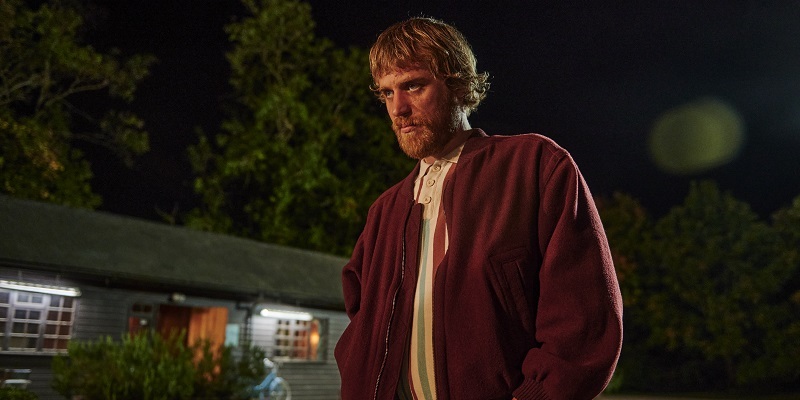
Review by
Benjamin Poole
Directed by: Malachi Smyth
Starring: Will Poulter, Naomi Ackie, Johnny Flynn, Lydia
Wilson

The Score, a crime-drama-musical debut from Malachi Smyth, starts with
promise. Cutting across three sequences, we see the main players - Mike
(Johnny Flynn, who also writes the film’s musical interludes),
Troy (Will Poulter) and Gloria (Naomi Ackie) - as they
wake up and go about facing a day which will have massive ramifications
for each of them. The former two source, respectively, a gun and a big
bag of loot as they are criminals, the latter peddles to work in an out
of the way café as she is down-to-earth and demoralised. The characters
sing their expositions, and you can’t help but be swept up in the cinema
of it all: the introductory number is a lowkey banger, Smyth employs
lovely split screen stylings, and, of course, there is Poulter’s big,
expressive Joker face. Unfortunately, however, as the two crooks make
their way to the aforementioned café for some sort of mysterious crime
rendezvous and proceed to just sort of hang about there for some time,
the intensity of this opening is not sustained.

Part of the problem is that the main characters are a completely
unlikeable couple of pricks, a factor which is further compounded by the
film affecting a sub-Guy Ritchie dynamic of positioning us alongside
them; this astonishing assumption that we’ll find the bullying antics of
these thick little wastemen amusing and ‘rough and tumble’. It gets your
goat. A case in point occurs when the would-be lads stop off at a petrol
station en route. The chap working the till is portly and he works the
till in a petrol station: he must be a chump. What a chump, we think!
Hahaha, we laugh when Mike intimidates this chump by refusing to pay the
5p charge for a bag. Mike is so cool when he eyeballs this chump by
dropping his sunglasses and staring at him and then insisting on using
the staff only toilet! What a tough guy. He’s like Al Pacino or
something. I bet he didn’t even flush. Oh, look out, in the background,
Troy is engaging in the world’s most unconvincing punch-up with two
strangers who have looked at him wrong - Mike wraps a phone cord around
the chump’s throat and threatens to cut his arm off! ‘No calls!’. Yikes!
All of this, however, is fatally undermined by Flynn’s undeniable
resemblance, with his bowl haircut and shredded wheat beard, to one of
the Inspiral Carpets. If this guy stepped to you you’d have to laugh, or
affect the indie ‘walking across a bouncy castle with a pint in each
hand’ Manchester stomp as a pisstake.
Don’t worry though, despite Troy being the sort of person who
(implausibly) beats the shit out of people because he doesn’t like the
way they look at him, he’s alright really. He’s sensitive. He’s
sensitive because when these two banter lords arrive at the café, Troy
immediately falls in love with the waitress there. Mike, of course,
treats her like shit on his shoe - for a supposedly petty criminal whom
the film suggests is a product of a deprived environment, Mike has the
entitled attitude of a Bullingdon club member towards service staff.
Fair enough if his unlikability is a trait, but there is this
persistent, puzzling sense that The Score is playing his
actions for twee laughs. It’s a problem for a film which trades on
character. This confusion extends to the apparent Of Mice and Men nature
of the partnership too, wherein Troy is a naive loose cannon, and Mike
the apparently calmer old hand. Mike’s complete lack of professionalism
and contemptuous nature muddies this portrayal, though: for a pair who
are meant to be on the downlow in anticipation of some big score
(involving, as we know, a shooter), he constantly draws attention like a
proper little mook.

The musical aspect of The Score has a soliloquy function,
in that it is utilised to articulate each character’s thoughts and
emotions, with the rhythm and melody having an instructional, rather
than expressive, metre. But while the genre hybridity does give the film
a sense of novelty, ultimately the songs tend to slow the narrative
rather than deepen it - and it doesn’t really help that none of the
characters' motivations need more elaboration than what is already
effectively communicated by the talented players’ performances
(especially in the case of Poulter and Ackie, whose chemistry is radiant
- I could watch Will Poulter all day). It just sort of goes on and on,
really, kicking its heels until the tbf quite thrilling ending when the
film finally makes good on the darker promise of the opening.

One of the film’s whimsies involves an ongoing disambiguation of the
word ‘score’: background music, slang for twenty notes, etc. In terms of
‘the record of points or strokes made by the competitors in a game or
match’ definition of the word, The Score gets an average:

The Score is in UK cinemas from
September 9th.

